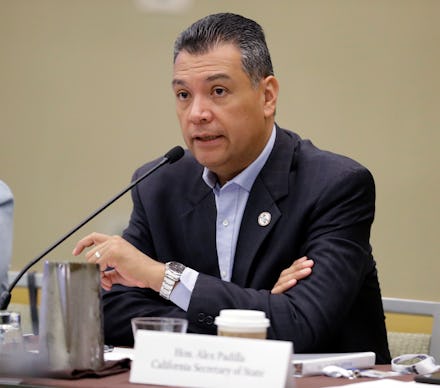As lawsuits pile up, elections officials push back at “voter fraud panel” on Mike Pence’s home turf

The nation’s secretaries of state wrapped up their summer meeting Monday by passing a defiant resolution on President Donald Trump’s Election Integrity Commission as lawsuits continued to pile up against the panel.
Notably, the meeting took place in Indiana, the home state of Vice President Mike Pence, who serves as chairman of the controversial commission.
“With the unanimous vote, the National Association of Secretaries of State — both Republicans and Democrats — continue to push back on the commission as outlined in the resolution,” California Secretary of State Alex Padilla said in an interview.
The panel’s request for detailed information on voters from all 50 states has raised concerns the data could be centralized and breached by hackers or identity thieves, among other worries.
A fluctuating number of states have refused to provide the information or have said they’ll only partially comply with the request.
The resolution, according to a copy viewed by Mic, noted that “states are responsible for protecting the integrity of their elections including the secrecy of the ballot, security of their election infrastructures and sensitive personal information included in the states’ voter rolls” and said the secretaries “reaffirm their commitment to strengthening election cyber security, improving processes, and increasing voter participation.”
“That applies to the year 2016, and for elections to continue to be conducted with integrity, keep leaving it to the states to do our job because we’re doing it well,” Padilla said. “[By agreeing on the resolution], we remind the advisory commission and the president, ‘Look, the Constitution says states run elections and we stand by previous statements that the elections have been conducted with integrity.’”
The group, members of which were reportedly still on the fence about the federal data request over the weekend, also voted in Republican Connie Lawson, Indiana’s secretary of state, as its new leader.
Lawson is among the officials who have said state law doesn’t allow them to fulfill the panel’s request in its entirety.
First thing Monday morning, Andrew Kossack, the federal employee named as the point of contact for the presidential commission, sent an email to elections officers telling them to hold off on providing data pending the outcome of a lawsuit filed by the Electronic Privacy Information Center, also known as EPIC.
The EPIC suit, per the organization, “challenged the commission’s use of a Department of Defense website to collect millions of state voter records — an unsecure system that is not approved for storing the public’s personal data.”
The panel’s email in response to the EPIC case, provided to Mic by a source, said recipients would get further instructions once a judge had ruled.
Kossack has not responded to Mic’s requests for comment about the commission, which was created following the president’s repeated but evidence-free claims of systemic voter fraud.
A spokeswoman for Kris Kobach, the Kansas secretary of state who helps run the commission — and who was notably absent from the NASS summer meeting but tweeted out arguments in favor of probing voter fraud — also failed to respond. Kobach previously said through his spokeswoman that a complaint alleging he’s using his role on the panel to advance his run for Kansas governor is mere political gamesmanship.
Academic observers on social media pointed out the irony of Kobach’s panel sending the states, including Kobach’s own Kansas, a note asking that they hold off on fulfilling the panel’s own request for information.
The NASS resolution, along with a letter to the presidential panel also released Monday by the group Democratic Secretaries of State, dovetails with new legal challenges to the panel on top of the EPIC suit.
Among them: American Civil Liberties Union v. Donald Trump, filed Monday in federal district court in Washington, D.C., “charges the commission with failing to comply with the Federal Advisory Committee Act, which is designed to ensure public accountability,” the ACLU said in a statement Monday.
While the panel is not set to meet in person until July 19, with no spoken comments or questions from the public, the suit claims that in holding the conference call resulting in Kobach sending the data request, the panel in fact held its first meeting without making it open to the public.
“This process is cloaked in secrecy, raising serious concerns about its credibility and intent,” Theresa Lee, a staff attorney with the ACLU’s Voting Rights Project, said in the statement. “What are they trying to hide?”
The Lawyers’ Committee for Civil Rights Under Law on Monday also entered a complaint in the District of Columbia that seeks to stop the Pence-Kobach panel from meeting.
The organization, which has previously called the president’s panel a meritless potential tool for voter suppression, filed suit against the panel for “failure to operate in a transparent manner under the Federal Advisory Committee Act.”
Kristen Clarke, the president and executive director of the civil rights group, said in a statement that the committee is “using an important statutory tool to expose and curb the illegitimacy of this [election panel] and to bar the commencement of any meetings before they make materials available for our inspection.”